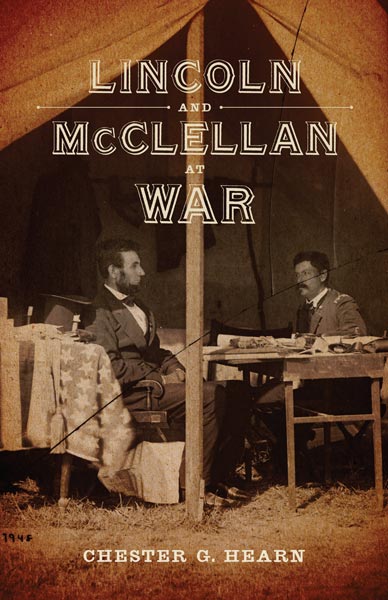 Lincoln and McClellan at War Lincoln and McClellan at War
Chester G. Hearn
Narrated by Neal Vickers
Available from Audible
Book published by Louisiana State University Press
At the beginning of the Civil War, President Abraham Lincoln and his highest-ranking general, George B. McClellan, agreed that the United States must preserve the Union. Their differing strategies for accomplishing that goal, however, created constant conflict. In Lincoln and McClellan at War, Chester G. Hearn explores this troubled relationship, revealing its complexity and showing clearly why the two men—both inexperienced with war—eventually parted ways.
A staunch Democrat who never lost his acrimony toward Republicans—including the president—McClellan first observed Lincoln as an attorney representing the Illinois Central Railroad and immediately disliked him. This underlying bias followed thirty-five-year-old McClellan into his role as general-in-chief of the Union army. Lincoln, a man without military training, promoted McClellan on the advice of cabinet members and counted on “Little Mac” to whip the army into shape and end the war quickly. McClellan comported himself with great confidence and won Lincoln’s faith by brilliantly organizing the Army of the Potomac. Later, however, he lost Lincoln’s trust by refusing to send what he called “the best army on the planet” into battle. The more frustrated Lincoln grew with McClellan’s inaction, the more Lincoln studied authoritative works on military strategy and offered strategic combat advice to the general. McClellan resented the president’s suggestions and habitually deflected them. Ultimately, Lincoln removed McClellan for what the president termed “the slows.”
According to Hearn, McClellan’s intransigence stemmed largely from his reluctance to fight offensively. Thoroughly schooled in European defensive tactics, McClellan preferred that approach to fighting the war. His commander-in-chief, on the other hand, had a preference for using offensive tactics. This compelling study of two important and diverse figures reveals how personality and politics prolonged the Civil War.
Chester G. Hearn is the author of Six Years of Hell: Harpers Ferry during the Civil War; When the Devil Came Down to Dixie: Ben Butler in New Orleans; The Capture of New Orleans, 1862; Ellet’s Brigade: The Strangest Outfit of All; and Lincoln, the Cabinet, and the Generals
REVIEWS:
“A focused, well-written, and persuasive examination of one of the war's most controversial relationships.”
—Matthew Norman, Journal of Southern History “A tension-filled narrative... a rich and attentive portrait of two men, so divergent in their politics and personalities, as they attempted to navigate the precarious early years of the war.”
—North Carolina Historical Review “Prolific writer and historian Chester G. Hearn has produced a solid and insightful analysis of the flawed working relationship between Abraham Lincoln and his commanding general, Pennsylvania native George B. McClellan. The strength of this study lies in its superbly organized and well-crafted narrative, which should earn it a place on any Civil War historian's bookshelf.”
—Pennsylvania Magazine of History and Biography “Chester G. Hearn's Lincoln and McClellan at War provides readers with valuable insights into the conflict that existed between President Lincoln and his commander of the Army of the Potomac. While every war fought by the United States contains some element of conflict between political and military leaders, Hearn's book provides readers a lasting reminder of the tragic consequences of the poor relations that existed between Lincoln and McClellan. Unfortunately, history repeated itself with similar themes almost a century later on another peninsula halfway around the world between President Harry Truman and Gen. Douglas MacArthur. Both would have benefited greatly from Hearn's historical insights.”
—Military Review “Military historian Chester G. Hearn has done some masterful work in finally offering to Civil War students some plausible reasons for ‘Little Mac’s’ puzzling offensive and political behavior. Thanks to his strong science and business background, Hearn has plumbed McClellan’s mindset and behavior pattern in a unique and convincing way that offers new insight into the shortcomings that destroyed the general most beloved by the Army of the Potomac.”
—William P. Garvey, president of the Jefferson Educational Society
|

